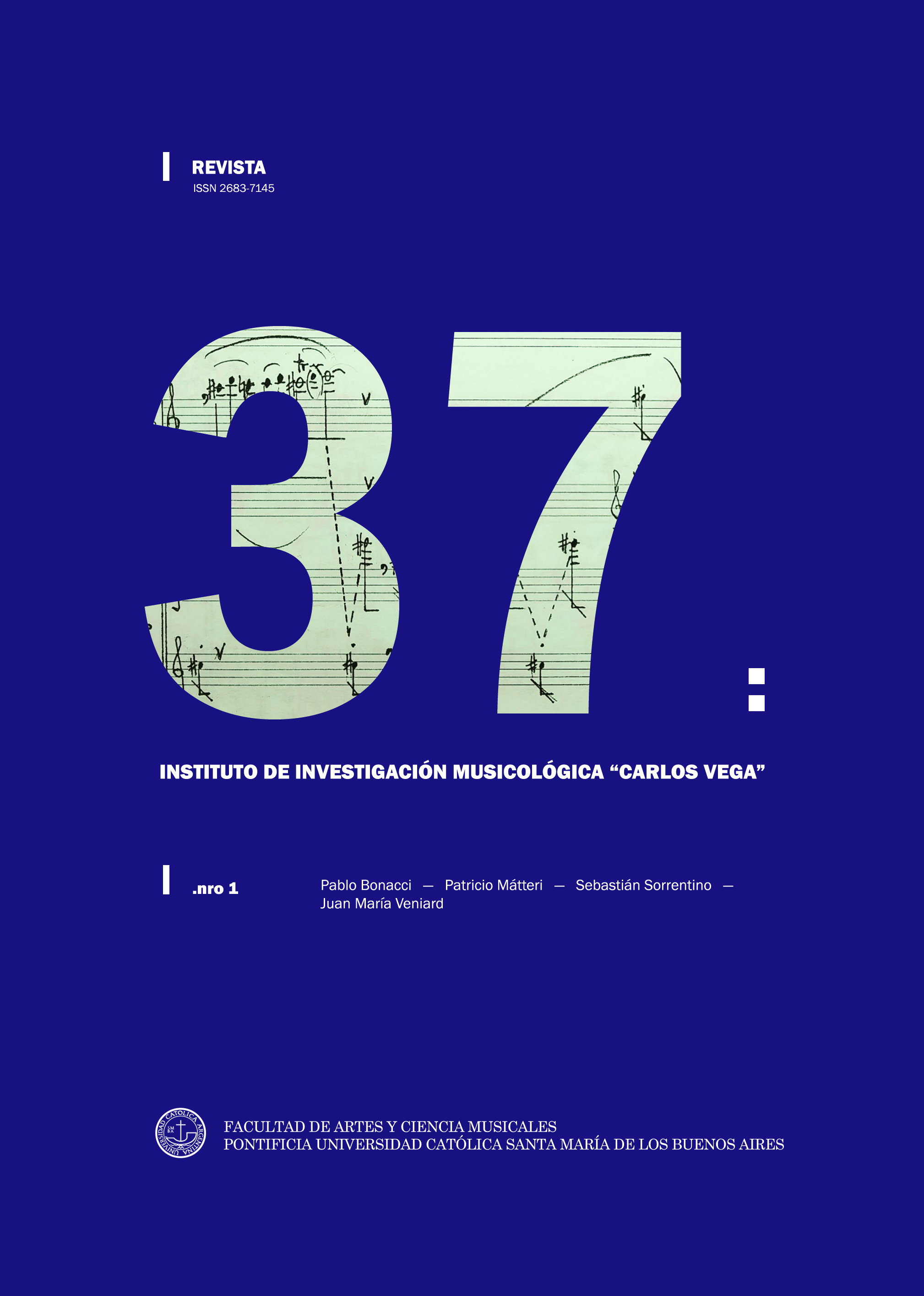Introduction to formal analysis of Ginastera’s ‘objective nationalism’ symphonic works
Keywords:
Ginastera, objective nationalism, musical analysis, musical formAbstract
This article, part of a research project at UCASAL, is devoted to the analysis of works from Alberto Ginastera’s nationalist period, such as the ballet suite Panambí, dances of the ballet Estancia op. 8a, Obertura para el “Fausto” Criollo op. 9 and Ollantay op.17. After presenting a general description of each piece and reviewing relevant background information, the central focus lies in the musical analysis of the scores. The objective is to clarify the structure and order of the compositions through a form analysis of the themes in each movement and work, as well as the study of rhythmic groups. The purpose is to provide interpretative tools and a deeper understanding of these pieces for performers and others interested in the nationalist phase of Ginastera's work.
Downloads
References
Dellmans, G. (2016). Fausto, Anastasio, Fierro, y otros. Un homenaje Sinfónico a Alberto Ginastera (1916-2016). Disponible en https://emtempranos.com.ar/publicacion/fausto-anastasio-fierro-yotros-un-homenajesinfonico-a-alberto-ginastera-1916-2016/
Ginastera, A. (1951). Obertura para el “Fausto” Criollo. Barry Editorial.
Ginastera, A. (1958). Danzas del Ballet “Estancia”. Barry Editorial.
Ginastera, A. (1964). Suite del ballet “Panambí”. Barry Editorial.
Ginastera, A.(1964b). Ollantay. Barry Editorial.
López González, L. (2012). Danzas del Ballet “Estancia” op. 8a Alberto Ginastera. Un acercamiento a la obra. Doctoral dissertation. Universidad EAFIT.
Lovern, K. (2015). The musical language of Alberto Ginastera’s Panambí and the influence of Claude Debussy’s La Mer and Igor Stravinsky’s Le Sacre du Printemps. Master of Arts (Music Theory), University of North Texas.
Manso, C. (2006). Juan José Castro. De los Cuatro vientos.
Scarabino, G. (1992). El agrupamiento de compases: contribución al estudio de sus fundamentos y aplicaciones. Revista del Instituto de Investigación Musicológica Carlos Vega, 12(12). Disponible en:n https://repositorio.uca.edu.ar/bitstream/123456789/1333/1/agrupamie
nto-compases-contribucion-estudio.pdf.
Scarabino, G. (2022). Alberto Ginastera: técnicas y estilo: 1935-1954. Buenos Aires. Educa.
Disponible en: https://www.iimcv.org/docs/ebooks/ebook_10.pdf
Schwartz-Kates, D. (2002). Alberto Ginastera, Argentine Cultural Construction, and the Gauchesco Tradition. The Musical Quarterly, 86(2).
Signorelli, M. (24 de septiembre de 2016). Imágenes gauchescas en las representaciones coreográficas de Estancia de Alberto Ginastera. Exposición presentada en el marco del Mes Ginastera. Conservatorio de Música “Gilardo Gilardi” de La Plata.
Sottile, A. (2016). La práctica de la cita en Alberto Ginastera. Revista del Instituto Superior de Música, 16, 131-156.
Suárez Urtubey, P. (1972). Alberto Ginastera en cinco movimientos. Editorial Victor Lerú.
Downloads
Published
How to Cite
Issue
Section
License
Copyright (c) 2024 Pablo Bonacci

This work is licensed under a Creative Commons Attribution-NonCommercial-ShareAlike 4.0 International License.





 e-ISSN 2683-7145 | ISSN 1515-050X
e-ISSN 2683-7145 | ISSN 1515-050X